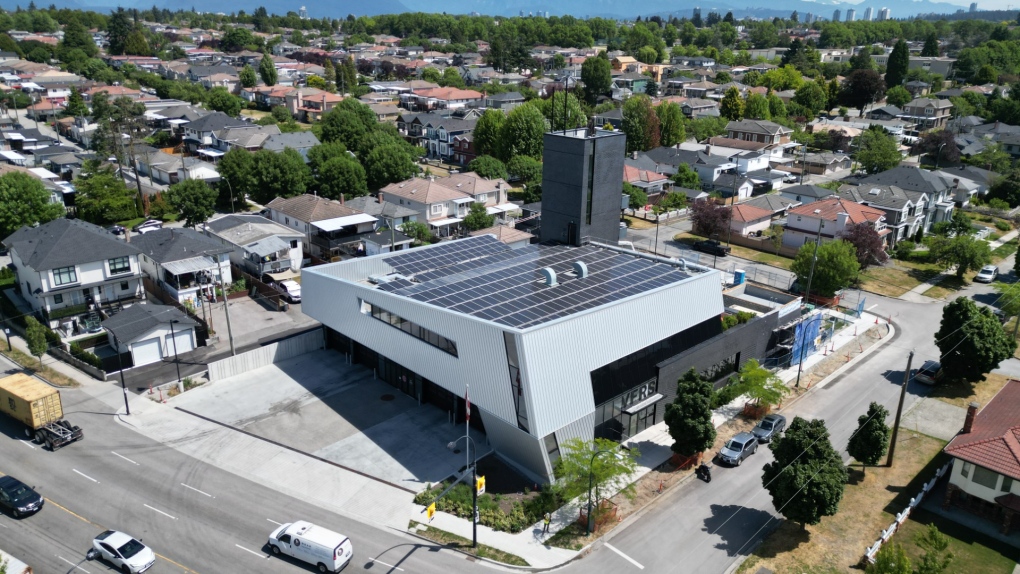Thousands of kilograms of CO2 went into building Vancouver's 'carbon-zero' fire hall
 Vancouver's new Firehall 17 is seen in this photo provided by the City of Vancouver.
Vancouver's new Firehall 17 is seen in this photo provided by the City of Vancouver.
The City of Vancouver says Canada's first "carbon-zero" fire hall will reduce operational emissions by 99.7 per cent compared to its predecessor, but there was still a significant amount of carbon emitted to construct the facility.
In fact, the city estimates it will take approximately seven years for the reduction in greenhouse gas emissions from operating the new Fire Hall 17 to offset the amount emitted building it.
The city referred CTV News to a case study it published in September 2020, while the building was under construction.
The study calculated the building's "embodied carbon emissions" as 778,000 kilograms of carbon dioxide equivalent, or about 424 kilograms per square metre.
"This makes up 97 per cent of the building’s total life cycle GHG emissions," the document reads. "Additionally, more than 90 per cent of the embodied carbon is released before the building starts its operation. Therefore, future zero-carbon buildings must explore ways to minimize not only their operational but also their embodied carbon emissions."
Most of the new fire hall's embodied carbon emissions – about 81 per cent, according to the document – are associated with the "product," meaning the materials used for the construction. Another nine per cent come from the construction process and the remaining 10 per cent from the building's anticipated 60 years of operation and emissions from its "end of life."
These calculations don't include the emissions associated with tearing down the old fire hall, but the city said that total is "expected to be low since approximately 91 per cent of the demolition waste was diverted from landfill."
Continuing to operate the old building would have been more carbon-intensive over the long term and, according to the city, was not an option.
"Fire Hall 17 was in need of replacement as the building no longer met the structural, operational or space needs," the city said in an emailed statement.
"The new fire hall is larger and is designed and built to better respond to the needs of Vancouver Fire Rescue Services today."
Located at 7070 Knight St., the new Fire Hall 17 is the second-largest Vancouver Fire Rescue Services training site, and is designed to be a post-disaster communications hub, housing equipment that could be used to keep the community connected after a major earthquake or similar catastrophe.
Still, the city said its Climate Emergency Action Plan – adopted after construction of Fire Hall 17 began – has provisions requiring lower embodied carbon emissions for future city-owned building projects.
The city's target is a 40-per-cent reduction in embodied carbon emissions – from 2019 levels – by 2030.
"We have committed to demonstrate leadership to help learn what is practical for setting embodied carbon requirements for future changes to rezoning and building bylaws," the city said. "If this requirement had been implemented prior to building the Fire Hall 17 project, the embodied carbon emissions would have been offset by operating carbon emission savings in just over four years instead of seven years."
CTVNews.ca Top Stories

Former PM Chretien says Liberal party must move back to 'radical centre'
As the Liberal party searches for a new leader, former prime minister Jean Chretien says it's time for the party to move back to the "radical centre" to help its electoral fortunes.
Are there U.S. military bases and American troops in Canada?
The U.S. military has more than 165,000 troops deployed in over 170 countries and territories, including Canada.
'Everything is on the table': Joly won't rule out cutting off energy exports to U.S. in face of Trump tariff threat
Foreign Affairs Minister Melanie Joly is not ruling out any countermeasures when it comes to dealing with U.S. president-elect Donald Trump — his threat of significant tariffs on Canadian imports, in particular.
Royal treasures hidden since Second World War recovered from cathedral
Historical treasures hidden for decades have been uncovered in the crypts of a cathedral, with items including burial crowns and insignia belonging to Medieval European rulers.
'Thankful for the rest of my life': Woman's final goodbye with father captured on video at Winnipeg airport
One woman is expressing her deepest gratitude to the Winnipeg Richardson International Airport after the staff helped her retrieve the security footage of her final moments with her father.
A father who stayed by his son's bedside were among the victims in California's wildfires
An amputee and his son with cerebral palsy were among the 11 deaths in the fires raging around Los Angeles. The father was found at his son’s bedside.
Lone sailor trapped in ice sparks concern in Southern Georgian Bay
A lone sailor living on a sailboat trapped in the Georgian Bay ice has sparked concern among Penetanguishene residents.
Former B.C. premier says she 'misspoke' when claiming she was never a Conservative
Former British Columbia premier Christy Clark, who is considering a run for federal Liberal leader, has backtracked on her claim this week that she'd never been a member of the Conservative party.
U.S. special counsel Jack Smith has resigned
U.S. Special counsel Jack Smith has resigned from the Justice Department effective Friday, according to a court filing.
































